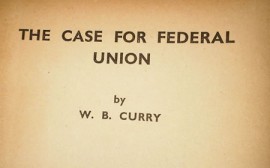
from “The Case for Federal Union”, by W B Curry (published in 1939)
When the adjustment [in reaction to technological development] takes place across national frontiers, vested interests are in the most favourable position for resistance, for they can at once appeal to national prejudice, on the ground that home labour is being thrown out of work by foreign importations. There is no limit to the nonsense on this topic that is both talked and believed. I read an article recently by the motoring correspondent in one of the Sunday newspapers, in which he claimed that since, on the average, it takes one man one year to make a motor car, for every foreign motor car imported into this country, an Englishman is thrown out of work for a year. This was set forth in all seriousness, and doubtless accepted by most of his readers, as an argument against imported cars. After years of public discussion of this subject it seemed never to have entered his head that the imported car would be paid for, that the payment would normally take the form of British exports, that British labour would be employed in producing these exports. And that the possibility of these exports being bought resulted directly from the sale of the foreign car to an Englishman.
For all I know, it would be possible, if one took sufficient trouble, to grow bananas under glass at John o’Groats, and, given a sufficiently large subsidy or tariff the industry might even become profitable. It would create so much employment per banana that we should presently read in the columns of a Sunday newspaper that every imported crate of bananas threw a great many Englishmen out of work for a year. That the high resulting cost of the bananas would deprive large sections of the British population of a valuable food-stuff would not, to our economic nationalists, seem a consideration of any very great importance.
In short, economic nationalism does not make sense. No economist of any repute doubts for one moment that a peaceful world, practising universal free trade, would be richer than a world whose trade is choked with prohibitions, quotas, licences, tariffs, currency restrictions, and every other sort of interference with the free flow of trade across national frontiers.
This extract was taken from “The Case for Federal Union”, by W B Curry, published in 1939. The book sold more than 100,000 copies.
